小学英语牛津版AMM知识点汇总
小学英语牛津版AMM知识点汇总

M3U1 Around the city一Words 单词1. around 绕着2. city 城市3. hotel 旅店;旅馆4. bank 银行5. hospital 医院6. bakery 面包房7. museum 博物馆8. cinema 电影院9. along 沿着 10. left 左边反义词:right 右边二Phrases 词组1. Excuse me. 劳驾;请问2. get to City Cinema 到达城市影院3. get to the zoo 到达动物园4. take an/the underground 乘地铁5. at Brown Street Station 在布朗街车站6. get off at Sea Street Station 在海洋街车站下车7. on Park Road 在派克路8. walk/go along Green Road 沿着格林路走9. turn left 向左转 10. at the first crossing 在第一个十字路口11. next to the underground station 紧靠地铁站三Sentences 句子1. Excuse me. How do I get to City Cinema请问;我怎么到达城市电影院2. Take the underground at Brown Street Station and get offat Sea Street Station.在布朗街车站乘地铁;在海洋街车站下车..3. Walk/Go along Green Road and turn left; and then cross Park Street.沿着格林路向左转;然后穿过派克街..M3U1 At the zoo一Words 单词1. meet 见面同音词meat2. crocodile 鳄鱼3. lane 小路;巷;弄4. great 好极了5. zebra 斑马6. snake 蛇7. monkey 猴子8. lion 狮子 9. ocean 海洋 10. world 世界 11. sea 大海同音词see12. turn 转动 13. shark 鲨鱼 14. afraid 害怕反义词brave15. dolphin 海豚 16. pool 池塘 17. cute 娇小伶俐的近义词clever18. restaurant 饭店 19. ask 问反义词answer 20. dark 黑暗的反义词bright21. giraffe 长颈鹿 22. naughty 调皮的 23. laugh 大笑微笑smile二Phrases 词组1. different animals 不同的动物2. look at a map of the zoo 看一张动物园的地图3. on our right 在我们右边on our/the left4. after that从那以后5. walk along Winter Lane 沿着Winter 路走6. a visit to Ocean Word 参观海洋世界7. sea animals 海洋动物 8. at Ocean World 在海洋世界9. in a big pool 在大池塘里 10. twelve fifteen 十二点一刻a quarter past 1211. look for a restaurant 寻找饭店12. get to the restaurant 到达饭店13. make us laugh 让我们大笑三Sentences 句子1. Peter meets his friends at the zoo.Peter在动物园见他的朋友..2. They are looking at a map of the zoo.他们在看一张动物园的地图..3. The Wangs are going to Ocean World.姓王的一家人正准备去海洋世界..4. The dolphins are jumping and swimming in a big pool.海豚正在大水池里跳跃;游泳..5. Go along Green Road and turn right at the first crossing.沿着格林路走;在第一个路口向左转..M3U2 Buying new Clothes一Words 单词1. clothes 衣服2. button 纽扣3. zip 拉链4.pocket 口袋5. which 哪一个6. dress 连衣裙复数dresses7.shirt 男衬衫8. blouse 女衬衫 9. T-shirt T恤衫 10. skirt 短裙11. shorts 短裤12. pants 裤子同义词trousers 13. price 价格 14.try 试一试15. buy 买反义词sell 16. idea 主意 17.pretty 漂亮的二Phrases 词组1. put on her dress 穿上她的连衣裙2. at a clothesshop 在衣服店3 a pair of shoes 一双鞋 4. two pairs oftrousers 两条裤子5. the pink ones 粉色的那些6. try on 试穿7. a good idea 一个好主意 8. too small太小了9. which T-shirt 哪一件T恤衫三Sentences 句子1. Which coat do you like I like the green one.你喜欢哪一件外套我喜欢绿色的那件..2. How much is it It’s 85 yuan.它多少钱 85元..3. How much are the pants They are 70 yuan.裤子多少钱 70元..4. My dress is too small. Yes. You need a new dress;I think.我的连衣裙太小了.. 是的..我想你需要一件新的..5. Why not try on both Good idea.为什么不两件都试一下呢好主意..M3U2 Buying new Clothes一 Words 单词1. pretty 漂亮的反义词ugly 丑陋的2. emperor 皇帝3. magic 魔术4. nod 点头5. smile 微笑6. money 钱7. keep 保持8. silent 安静的 9. cry 哭三单cries10. nothing 没有东西 11. dot 圆点12. truth 实话形容词true真实的 13. sweater 毛衣14. raincoat 雨衣15. slippers 拖鞋 16. sneakers 旅游鞋;胶底鞋 17. boots 靴子二 Phrases 词组1. try on these dresses 试试这些连衣裙2. look great on you 太适合你了3. take the blue one 买蓝色的一条4. with some new clothes 带着一些新衣服5. with a big smile 笑容可掬6. a lot of money 许多钱7. put on new clothes 穿上新衣服wear new clothes 穿着新衣服8. keep silent 保持安静 9. cry out 大喊大声疾呼10. polka dot 带圆点花纹11. hundreds of polka dots 数百个圆点;成百上千个圆点三 Sentences 句子1. What do you think; Mum They look great on you.妈妈;你觉得怎么样它们看上去很适合你..2. Then let’s take the blue one.那我们就买蓝色的那条..3. One day; a man visits the emperor with some new clothes.一天;一个男人带着新衣服拜访了这个皇帝..4. The emperor cannot see any clothes; but he nods with a bigsmile and says; “ They are so beautiful”皇帝看不见衣服;但他笑容可掬地说:“衣服多么漂亮”M3U3 Seeing the Doctor一 Words 单词1. fever 发热2. toothache 牙痛3. cough 咳嗽4.rest 休息5. warm 温暖的反义词cool 凉爽的6. dentist 牙医7. medicine 药8. soft 软的反义词hard 硬的 9. before 在…之前反义词after在…之后10. should 应该shouldn’t= should not 不应该 11. soon 不久之后 12. will 将13. good 好的近义词:well 身体好的比较级: better 最高级: best二 Phrases 词组1. see the doctor 看医生2. have a cold 得了感冒3. wear warm clothes 穿暖和的衣服4. have a good rest 好好休息一下5. drink a lot of water 喝很多水6. drink too much soft drinks 喝太多软饮料7. take some medicine 吃一些药 8. feel well 感觉良好9. have a look 看一看三 Sentences 句子1. I have a toothache. What should I doYou should go to see the dentist. You shouldn’t eat too many sweets.我牙痛;我应该干什么你应该去看牙医..你不应该吃太多的糖..2. I have a cold. What else should I doYou should go to see the doctor. You should drink a lot ofwater and have a good rest.我得了感冒;我应该干什么你应该去看医生..你应该喝很多水;好好洗休息一下..3. What’s wrong with you How do you feel I have a cough.你怎么啦你感觉怎么样我咳嗽了..4. Kitty is not feeling well.Kitty 今天感觉不好..5. You will be better soon.你很快就会好的..M3U3 Seeing the Doctor一 Words 单词1. either 也用于否定句和疑问句;同义词 too用于肯定句2. toothless 无牙的3. king 国王4. hide 躲藏5. themselves 他们自己6. cave 洞穴7. secret 秘密8. present 礼物近义词gift 9. meeting 会议10. really 真的 11. hurt 受伤;伤害12. worry 担心 13. become 变成;成为二 Phrases 词组1. come and have lunch 来吃午饭2. at the dentist’s 在牙科诊所3. brush your teeth 刷牙4. in the evening在傍晚at night在深夜5. look at your teeth 看你的牙齿6. how many times多少次7. I see. 我明白了.. 8. the king of theforest 森林之王9. be afraid of 害怕 10. have a meeting开会11. hide themselves 把他们自己藏起来12. in a secret cave 在秘密的山洞里 13. have an idea有了主意14. a large packet of sweets 一大袋糖果 15. pull out 拔掉16. What’s wrong=Wha t’s the matter 怎么啦三 Sentences 句子1. Peter and his mum are at the dentist’s.Peter和妈妈在牙医诊所里..2. You shouldn’t drink too much soft drinks.你不应该喝太多软饮料..3. How many times a day do you brush your teeth Once;in the morning.你一天刷牙几次一次;在早上..4. The fox gives the tiger a large packet of sweets.狐狸给老虎一大袋糖果..5. They pull out all the tiger’s teeth. He becomes a toothless tiger.他们拔掉了老虎所有的牙齿..他变成了一只无牙的老虎..M4U1 The Natural World一 Words 单词1. first /f :st/ 首先;第一的2. next 下一个3. then 然后4. finally fa n li最后形容词final5. boil b l煮;烧开6. cup 茶杯、7. pour p :r倒;灌8. tea pot 茶壶 9. taste te st尝二 Phrases 词组1. make some tea 泡茶2. boil the water 烧水3. put some tea into the cup 放一些茶叶在茶杯里4. pour hot water into the cup 把热水倒在茶杯里5. drink some tea 喝茶6. in the kitchen 在厨房里7. taste great 味道好极了三 Sentences 句子1. Let’s make some tea. What do we doFirst we boil the water. Next we put some tea into the cup.Then; we pour hot water into the cup. Finally we drink the tea.让我们泡茶.. 我们做什么呢先烧水;接着放一些茶叶在茶杯里..再把热水倒入茶杯里..最后喝茶..2. Kitty is in the kitchen with her grandma.Kitty 和她的奶奶在厨房里..3. Would you like some tea Yes; please.你想要一些茶吗好的;请吧..M4U1 The Natural WorldWords 单词1. report r p :t报告2. start stɑ:t开始3. high 高的反义词:low 低的4. west west西面对应词east 东面5. through θru:通过6. gorge g :d 山峡;峡谷7. lake 湖区分river 河流8. part 部分9. journey d :ni旅程;行程 10. drop 掉下;滴下11. raindrop 雨滴 12. fall 落下13. rise ra z升起来 14. inside 在里面反义词outside15. sunlight 日光 16. hold 握着;抓住17. above 在…上方 18. rainbow 彩虹二 Phrases 词组1. give a report 作报告2. about the Yangtze River 有关长江3. in the west of China 在中国西部4. run down the mountains 流下山5. through the beautiful Three Gorges 经过风景秀丽的三峡6. part of the Yangtze River 长江的部分7. Little WaterDrop 小雨滴8. a piece of white paper 一张白纸 9. above the paper 在纸的上方三 Sentences 句子1. First the Yangtze River starts high in the mountains in thewest of China.首先;扬子江发源于中国西部的高山上..Next it runs down the mountains and through the beautifulThree Gorges.接着;它沿着山脉往下流;经过风景秀丽的三峡..Then it meets more water from many other lakes and rivers.然后;它与很多来自其他河流湖泊的水汇合..2. The sun shines and Little Water Drop gets hot. He rises upto the sky.太阳照耀着;小水滴变热了..他升上了天空..Little Water Drop flies over rivers and mountains.小水滴飞过了河流和山脉..Little Water Drop falls down to the ground.小水滴降落在了地上..3. Next; take them near the window; into the sunlight.接着;把它们拿到窗户边;太阳光下面..M4U2 Wind(一)Words 单词1. gently 轻轻地形容词:gentle 轻轻的 d entli2. strongly 强有力地;猛烈地形容词:strong 猛烈的;强壮的str l3. slowly 慢慢地形容词:slow 缓慢的4. quick 快速的形容词:quickly 快速地kw k5. happy 高兴的副词:happily 高兴地6. soft 柔软的副词:softly 柔软地7. wind 风 8. windmill 风车 w ndm l9. move 移动 10. blow 吹二 Phrases 词组1. no wind 没有风2. in the sea 在海里3. fly kites 放风筝4. in the wind 在风里三 Sentences 句子1. The wind blows strongly. The windmill moves quickly.风猛烈地吹着.. 风车转动得很快..2. The flowers dance in the wind softly.花在风中温柔地跳着舞..3. The children fly their kites happily.孩子们在高兴地放风筝..4. The wind blows. Sometimes it blows gently. Sometimes it blows strongly.风吹着.. 有时候它温柔地吹着.. 有时候它猛烈地吹着..M4U2 Wind一 Words 单词1. heavy 沉重有力的;剧烈的副词:heavily 猛烈地;厉害地2. tomorrow 明天3. wind-bell 风铃4.make 制作5. wood 木头6. circle 圆形7.line 线;绳8. fold 折叠 9. pin 针;别针;绑;别起来 10. sick小木棒二 Phrases 词组1. a rainy day 一个下雨天2. look out of thewindow 看窗外3. go out and play 出去玩4. some heavy rain 倾盆大雨5. a strong wind 一阵猛烈的风6. watch the weather onTV 在电视上看天气7. be made of wood 用木头制作 8. make a wind-bell制作风铃9. the sound of wind 风的声音 10. cut it out cut outthe circle 把圆剪下来11. cut along them the circles 沿着圆把它们剪下来12. fold as a windmill 折叠成风车13. pin it to a pencil or stick 别上一支铅笔或一根小棍三 Sentences 句子1. Mum ;can we go out now I’m afraid you can’t.妈妈;我们现在能出去吗恐怕你们不能..2. But tomorrow will be a fine day.但明天将会是个好天气..3. Little Duck has a glass wind-bell on her window.小鸭子有个玻璃的风铃在她的窗户上..4. Little Pig wants to hear the sound of the wind.小猪想要听风的声音..5. Draw eight lines and cut along them.画八条线;并且沿着线剪下来..6. Pin it to a pencil or a stick.别上一支铅笔或一根小棍..M4U3 Fire一Words 单词1. fire 火2. start 开始反义词:finish 结束3. campfire 营火;篝火4. match 火柴复数:matches5. safety 安全形容词:safe安全的6. must 必须否定:mustn’t 禁止7. forest 森林8.poster 海报9. careful 小心的副词:carefully 小心地;仔细地二Phrases 词组1. start campfire 开始营火2. play with matches 玩火柴3. play near fires 在火边玩耍4. talk about the firesafety 讨论消防安全知识三Sentences 句子1. For fire safety ; what mustn’t we do We mustn’t play with matches.为了消防安全;我们必须不能做什么我们绝不能玩火柴..2. Don’t start campfire = You can’t start campfire. = No starting campfire.不要启动营火3. Children mustn’t play near fires.孩子们绝不能在火边玩儿..4. People must be careful.人们一定要小心..5. Fires can start in forests; in schools and at home.火灾可能在森林里;在学校和在家里发生..M4U3 Fire一 Words 单词1. burn 燃烧;着火2. lucky 幸运的副词:luckily 幸运地3. hurt 受伤4. thick 浓的;厚的;粗的反义词:thin 稀的;薄的5. everywhere 到处6. helicopter 直升飞机7. drop 掉下现在分词:dropping8. fight 与…战斗;打架名词:fighter 战士9. brave 勇敢的副词:bravely10. use 使用现在分词:using 11. die 死亡形容词:dead12. age 年龄 13. cave 洞 14. heat 热量形容词:hot15. light 光;光亮 16. raw 生的 17. hate 恨反义词:love 爱18. lift 电梯 19. dangerous 危险的反义词:safe 安全的20. if 假如;如果 21. smoke 烟形容词:smoky 有烟雾的22. cover 覆盖 23. crawl 爬行;匍匐前进二 Phrases 词组1. in a country park 在乡村公园2. thick smoke 浓烟3. drop water on the fire 在火上浇水4. use a lotof water 用很多水5. die down 熄灭put out 扑灭6. put a sign 放一个标志7. in the Stone Age 在石器时代 8. give us heatand light 给我们光和热9. eat raw meat 吃生肉 10. not at all 一点也不11. throw it away into the fire 把塔扔进火里 12. go outside出去come inside 进来13. crawl out 爬出去三Sentences 句子1. The fire starts because people start a campfire.火灾发生是因为人们启动了营火..2. Helicopters are dropping water on the fire.直升飞机在火上浇水..3. Soon; the fire dies down.不久;火熄灭了..4. Fire gives us heat and light.火给我们光和热..5. It does not taste good at all.味道尝起来一点都不好..6. When you see a fire; quickly go outside.当你看见火的时候;赶快出去..。
(完整word版)三年级下牛津英语知识点整理M2,文档.doc
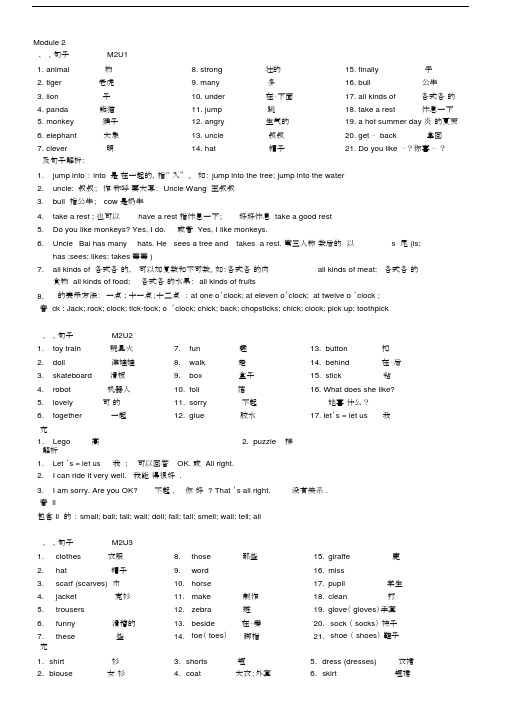
Module 2、、句子M2U11. animal 物8. strong 壮的15. finally 于2. tiger 老虎9. many 多16. bull 公牛3. lion 子10. under 在⋯下面17. all kinds of 各式各的4. panda 熊猫11. jump 跳18. take a rest 休息一下5. monkey 猴子12. angry 生气的19. a hot summer day 炎的夏天6. elephant 大象13. uncle 叔叔20. get ⋯ back 拿回7. clever 明14. hat 帽子21. Do you like ⋯?你喜⋯ ?及句子解析:1.jump into : into 是在一起的,指“ 入”。
如: jump into the tree; jump into the water2.uncle: 叔叔;作称呼要大写: Uncle Wang 王叔叔3.bull 指公牛; cow 是奶牛4. take a rest ; 也可以have a rest 指休息一下;好好休息 take a good rest5. Do you like monkeys? Yes, I do. 或者 Yes, I like monkeys.6. Uncle Bai has many hats. He sees a tree and takes a rest. 第三人称数后的以s 尾 (is;has ;sees; likes; takes等等 )7. all kinds of 各式各的,可以加复数和不可数。
如:各式各的肉all kinds of meat; 各式各的食物 all kinds of food; 各式各的水果: all kinds of fruits8. 的表示方法:一点 ; 十一点;十二点: at one o’clock; at eleven o’clock; at twelve o ’clock ;音 ck : Jack; rock; clock; tick-tock; o ’clock; chick; back; chopsticks; chick; clock; pick up; toothpick、、句子M2U21. toy train 玩具火7. fun 趣13. button 扣2. doll 洋娃娃8. walk 走14. behind 在⋯后3. skateboard 滑板9. box 盒子15. stick 粘4. robot 机器人10. foil 箔16. What does she like?5. lovely 可的11. sorry 不起她喜什么?6. together 一起12. glue 胶水17. let’s = let us 我充1. Lego 高2. puzzle 拼解析1. Let ’s = let us 我 ; 可以回答OK. 或 All right.2.I can ride it very well. 我能得很好 .3. I am sorry. Are you OK? 不起 , 你好 ? That ’s all right. 没有关系 .音 ll包含 ll 的: small; ball; tall; wall; doll; fall; tall; smell; wall; tell; all、、句子M2U31. clothes 衣服8. those 那些15. giraffe 鹿2. hat 帽子9. word 16. miss3. scarf (scarves) 巾10. horse 17. pupil 学生4. jacket 克衫11. make 制作18. clean 打5. trousers 12. zebra 斑19. glove( gloves)手套6. funny 滑稽的13. beside 在⋯旁20. sock ( socks)袜子7. these 些14. toe( toes)脚指21. shoe ( shoes)鞋子充1. shirt 2. blouse衫女衫3. shorts4. coat短大衣;外套5. dress (dresses)6. skirt衣裙短裙7. sweater毛衣8. a pair of一双;一9. What are these/ those?解析1. A pair of shoes 一双鞋子; a pair of sports shoes一双运鞋; a pair of trousers一条子; a pair ofsocks 一双袜子 ; a pair of shorts 一条短 ; a pair of gloves 一副手套 ; a pair of chopsticks 一双筷子 ; a pair of glasses 一副眼 ;2. put on穿上;wear 穿着。
牛津版英语小学知识点归纳总结
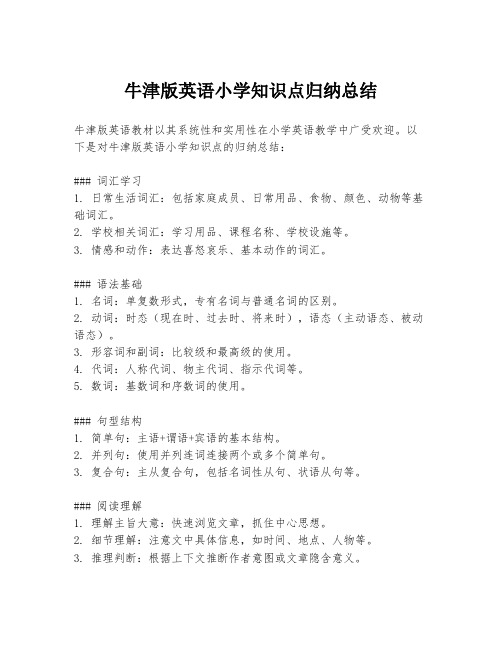
牛津版英语小学知识点归纳总结牛津版英语教材以其系统性和实用性在小学英语教学中广受欢迎。
以下是对牛津版英语小学知识点的归纳总结:### 词汇学习1. 日常生活词汇:包括家庭成员、日常用品、食物、颜色、动物等基础词汇。
2. 学校相关词汇:学习用品、课程名称、学校设施等。
3. 情感和动作:表达喜怒哀乐、基本动作的词汇。
### 语法基础1. 名词:单复数形式,专有名词与普通名词的区别。
2. 动词:时态(现在时、过去时、将来时),语态(主动语态、被动语态)。
3. 形容词和副词:比较级和最高级的使用。
4. 代词:人称代词、物主代词、指示代词等。
5. 数词:基数词和序数词的使用。
### 句型结构1. 简单句:主语+谓语+宾语的基本结构。
2. 并列句:使用并列连词连接两个或多个简单句。
3. 复合句:主从复合句,包括名词性从句、状语从句等。
### 阅读理解1. 理解主旨大意:快速浏览文章,抓住中心思想。
2. 细节理解:注意文中具体信息,如时间、地点、人物等。
3. 推理判断:根据上下文推断作者意图或文章隐含意义。
### 写作技巧1. 叙述文:描述事件或经历,使用第一人称或第三人称。
2. 说明文:介绍事物或解释概念,使用客观语言。
3. 议论文:表达观点,提出理由,使用逻辑连接词。
### 听力理解1. 捕捉关键信息:注意对话或短文中的关键词汇和短语。
2. 理解语境:根据上下文判断说话人的意图和情感。
3. 预测和推断:根据听到的信息预测接下来可能发生的事情或推断说话人的态度。
### 口语表达1. 自我介绍:使用简单句型介绍自己和家庭。
2. 日常对话:学习基本的问候语、询问和回答。
3. 描述和叙述:描述事物特征或叙述事件经过。
### 学习策略1. 记忆技巧:使用联想记忆、图像记忆等方法记忆词汇。
2. 笔记技巧:在课堂上做笔记,记录关键信息。
3. 复习策略:定期复习所学内容,巩固记忆。
### 文化意识1. 节日习俗:了解不同文化背景下的节日和习俗。
牛津版英语三年级知识点总结
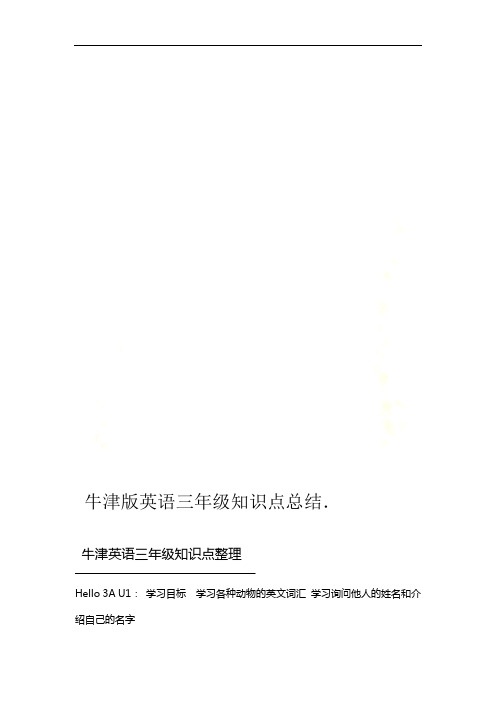
牛津版英语三年级知识点总结.牛津英语三年级知识点整理Hello 3A U1:学习目标学习各种动物的英文词汇学习询问他人的姓名和介绍自己的名字根据叫声识别动物a/an 学习冠词主要知识点…或My name's ●What's your name? 用来询问对方的姓名。
回答可以说:可以用来介绍自己的姓名。
I'm…者说:I'm…用在以元音音:a 用在以辅音因素开头的可数名词单词之前;an ●冠词a/an 素开头的可数名词单词之前。
Nice to meet you 3A U2:学习目标学习各种颜色的表达。
Nice to meet you.学习交际用语:What colour is it? 询问颜色:”来介绍人。
学习用“This is…主要知识点●Mrs 用于称呼已婚女士。
Miss 用于称呼未婚女士;Mr 用于称呼男性;●表达很高兴认初次与人见面,相互介绍以后,可以说:Nice to meet you.Nice to meet you, too.识对方。
回答可以说:●这是海伦。
This is ... 可以用来介绍人。
比如:This is Helen. ●可以用来询问事物的颜色。
What colour is it?This is my father :3A U3 学习目标学习各种水果的表达。
学习用“This is my... ”来介绍家人。
…/some…学习句型:I can see a 主要知识点,是形容词性物主代my 表示“我的””可以用来介绍家人。
●“This is my...This is my mother. 这是我的妈妈。
词。
例如:我能看到”表示“我能看到...。
例如:I can see a banana. ”●I can see …一支香蕉。
一an apple ●表示一个人或事物,名词用单数,前面加不定冠词a/an。
如:可以用来修饰名词的some 个苹果。
表示一个以上的人或事物,名词用复数。
三年级下牛津英语知识点整理M1(K12教育文档)

三年级下牛津英语知识点整理M1(word版可编辑修改)编辑整理:尊敬的读者朋友们:这里是精品文档编辑中心,本文档内容是由我和我的同事精心编辑整理后发布的,发布之前我们对文中内容进行仔细校对,但是难免会有疏漏的地方,但是任然希望(三年级下牛津英语知识点整理M1(word版可编辑修改))的内容能够给您的工作和学习带来便利。
同时也真诚的希望收到您的建议和反馈,这将是我们进步的源泉,前进的动力。
本文可编辑可修改,如果觉得对您有帮助请收藏以便随时查阅,最后祝您生活愉快业绩进步,以下为三年级下牛津英语知识点整理M1(word版可编辑修改)的全部内容。
Module 1Daily Dialogue 每日会话1. What day is it today? Today is ____________.Monday 星期一 Tuesday 星期二 Wednesday 星期三 Thursday 星期四Friday 星期五Saturday 星期六 Sunday 星期日2。
How do you go to …l? I go to there by ……/ on foot。
你怎么去…?我坐……/走路去…。
3。
How is the weather?天气怎么样? It's sunny/ rainy/ windy/ cloudy. 今天晴朗/下雨/刮风/多云.单词、词组、句子M1U1e…to…用…来(做)…2.five senses 五种感官3.seeing 视觉4.hearing 听觉5.aeroplane 飞机6.else 其他的7.bus 公共汽车8.ship 船9.car 小汽车10.What can you hear, Kitty? I can hear…凯迪,你能听见什么?我能听见…11.What do you hear? I hear …你听见什么?我听见…12.What else can you hear? 你还能听见什么?13.spinner 陀螺14.circle 圆圈15.toothpick 牙签16.spin 旋转17.What colour can you see?你能看见什么颜色?18.by the window 在窗边19.children 孩子们(单数child)20.I can't see them。
沪教牛津版M2U1知识点

2A Module 2 Me, my family and friendsUnit 1 I can swim (P14)一、知识点1.Supergirl(超级女孩),第一个字母S要大写,因为是人的名字,同样Danny也是,D大写。
2.拓展两个词组:very fast非常快,I can run very fast. 我能跑得很快。
very high 非常高,The bird can fly very high.小鸟能飞得很高。
3.can’t不能,是个缩写,can’t=cannot。
目前学过的缩写有:I’m=I am, You’re=You are, It’s=It is, What’s=what is4.but但是,表示转折,要学会运用。
如:This apple is red. Butthat apple is green. 这个苹果是红色的,但是那个苹果是绿色的。
5.会区别两个问句:(1) What can you do?你会做什么?I can …我会(2) Can you fly? 你会飞吗?No, I can’t. 不,我不会。
6.什么问什么答:(1)Can you swim? Yes, I can. No, I can’t. 问句是用can问,回答也用can(2)Can she run? Yes, she can. No, she can’t.Can he write? Yes, he can. No, he can’t.问句用she/he问,回答也要用she/he二、本课M1U3要求:1、单词要求:默写P14的四个单词,P17的两个单词2、正确抄写句子,注意单词缩写格式和句子的标点符号。
3、背诵要求:P15、16、17三、拓展要求:1、默写P15/5句四、说话Hello, I’m _____. I’m (年龄). I’m (fat/tall/big…). I can _____. But I can’t _____.。
上海牛津版小学三年级英语知识总结

上海牛津版三年级(上)Module 1 Getting to know youUnit 1 How are you?教学目标:1.学会在具体语境中正确使用新单词。
2.学会使用固定表达打招呼。
3.学会用固定句型介绍自己和他人。
4.学会表达某些信息。
重点难点:单词:Miss,Mr,Mrs语法:1.人称代词I, you2. 介绍自己I’m…/ 介绍他人This is…3. 给出某些信息We have…打招呼用语:1.Hello!Hi!2. Good morning/afternoon/evening/night.3.—How are you?—Fine, thanks./I’m fine too.课时安排:两个课时知识衔接:要求学生先自我介绍然后互相认识。
以此为情境把本次课的重要单词,句型,语法结合起来教学。
Unit 2 what’s your name?教学目标:1.学会在具体语境中使用关键词和短语。
2.学会用固定表达说出某人的名字。
3.学会使用祈使句做出指示。
重点难点:单词:stand up, sit down, open, close, door, name,book, write日常表达:--what’s your name?--my name is…语法:1人称代词your, my2 祈使句 stand up,sit down,look at课时安排:两个课时知识衔接:上节课大家互相认识了,这节课可以以上节课的内容过渡到询问名字。
Unit 3 how old are you?教学目标:1.学会用wh-questions询问别人的年龄。
2.学会用固定句型谈论别人的年龄。
3.学会询问特定信息。
4.学会表达祝福。
重点难点:单词:one—ten,today日常表达:问年龄-- how old are you?happybirthday!--here you are--thank you. Guess!语法1.数字one—ten2. it’s …/I’m…3.物主代词your4. Are you…?5.祈使句blow…和定冠词the课时安排: 2个课时。
2021年沪教牛津版(三起)三年级下英语知识点梳理-必会词汇、必会句型归纳拓展讲解总结
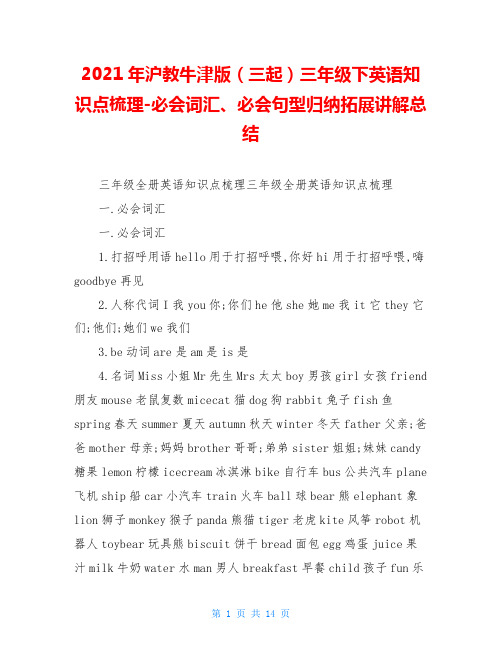
2021年沪教牛津版(三起)三年级下英语知识点梳理-必会词汇、必会句型归纳拓展讲解总结三年级全册英语知识点梳理三年级全册英语知识点梳理一.必会词汇一.必会词汇1.打招呼用语hello用于打招呼喂,你好hi用于打招呼喂,嗨goodbye再见2.人称代词I我you你;你们he他she她me我it它they它们;他们;她们we我们3.be动词are是am是is是4.名词Miss小姐Mr先生Mrs太太boy男孩girl女孩friend 朋友mouse老鼠复数micecat猫dog狗rabbit兔子fish鱼spring春天summer夏天autumn秋天winter冬天father父亲;爸爸mother母亲;妈妈brother哥哥;弟弟sister姐姐;妹妹candy 糖果lemon柠檬icecream冰淇淋bike自行车bus公共汽车plane 飞机ship船car小汽车train火车ball球bear熊elephant象lion狮子monkey猴子panda熊猫tiger老虎kite风筝robot机器人toybear玩具熊biscuit饼干bread面包egg鸡蛋juice果汁milk牛奶water水man男人breakfast早餐child孩子fun乐趣cow母牛horse马pig猪sheep绵羊worker劳动者cake蛋糕card卡片noodle面条birthday生日farm农场grass草stone石头head头body身体arm手臂hand手leg腿foot脚;足复数feetflower花tea茶5.其他fine健康的;身体很好的thank谢谢no不;不是not 不是yes是;对howmany用于问数量多少its它的tail尾巴what 什么in在某段时间内can能and和;同colour颜色taste味道;尝sorry对不起some一些too也;还dear亲爱的for给;为了to给;向bye再见great很好的;很棒的athome在家comein进来howold多少岁photo照片cup杯子day天;日idea 主意house房屋now现在there那里very很;非常6.形容词tall高的short矮的;短的fat胖的thin瘦的beautiful美丽的big大的long长的small小的late迟到good 好的cold寒冷的hot炎热的cool凉爽的warm温暖的black黑色的blue蓝色的green绿色的red红色的white白色的yellow黄色的orange橙色的sour酸的sweet甜的old老的strong强壮的;坚固的lovely可爱的afraidof害怕bad坏的little小的7.物主代词my我的your你的;你们的our我们的8.指示代词this这;这个these这些9.疑问词who谁how怎么,怎样10.身体部位名词hair头发eye眼睛ear耳朵nose鼻子mouth口;嘴巴face脸;面孔11.动词look看clean把擦干净;打扫close关上open打开hear听见listen听12.室内物品blackboard黑板door门window窗;窗户chair 椅子desk书桌bed床13.水果apple苹果banana香蕉orange桔子pear梨14.文具pen钢笔pencil铅笔schoolbag书包ruler尺book 书15.人称名词dad爸爸mum妈妈16.冠词the表示特指aan一;一个17.副词here这里18.短语lookat看howmuch用于问价钱多少19.感叹词please请20.数词one一two二three三four四five五six六seven七eight八nine九ten21.动词动词dance跳舞paint用颜料画read阅读sing唱歌skate滑冰swim游泳sleep睡觉work工作litter乱扔垃圾throw扔do做love爱go去;走make做二.必会句型1.Hello,ImPeter.你好,我是彼得。
牛津英语AM知识点总结
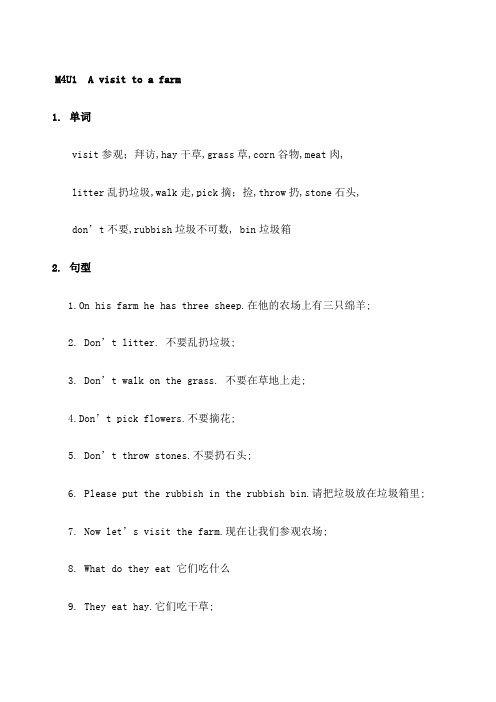
M4U1 A visit to a farm1.单词visit参观;拜访,hay干草,grass草,corn谷物,meat肉,litter乱扔垃圾,walk走,pick摘;捡,throw扔,stone石头,don’t不要,rubbish垃圾不可数, bin垃圾箱2.句型1.On his farm he has three sheep.在他的农场上有三只绵羊;2. Don’t litter. 不要乱扔垃圾;3. Don’t walk on the grass. 不要在草地上走;4.Don’t pick flowers.不要摘花;5. Don’t throw stones.不要扔石头;6. Please put the rubbish in the rubbish bin.请把垃圾放在垃圾箱里;7. Now let’s visit the farm.现在让我们参观农场;8. What do they eat 它们吃什么9. They eat hay.它们吃干草;10. He feeds the pig with the corn.他用谷物喂养猪;11. The pig lives in a pen.猪住在围栏里;12. It is angry.它生气了;3.语法:4. 1.单复数:sheep---sheep单复同形;5. horse----horses;6. child---children7. this---these;8. that---those9. 2.hay, grass, corn, meat, rubbish垃圾,都是不可数名词;10.3. feed the animals喂养动物; grow the plants种植植物11.4. Don’t litter. 换一种说法>>> You can’t litter.12.Don’t walk on the grass. 换一种说法>>> You can’t walk on the grass.13.5. let’s = let us让我们,后面跟动词原形:14.Let’s go. Let’s play. Let’s sing and dance.15.6. take a visit to + 地点, 一次去…的参观16.Let’s visit the farm. = Let’s take a visit to the farm.17.M4U2 At Century Park1.单词sketchbook素描本,cap帽子, camera-cameras相机, an aviary -aviaries 鸟舍,fountain喷泉, photo-photos照片, pond池塘, lovely =cute可爱的,far way 远的road道路,take乘坐、拍照2. 词组:at Century Park在世纪公园 in the picnic basket在野餐篮里,let me see我看一下, some peanut butter一些花生酱, have a picnic 去野餐,take the school bus= go there by bus 乘坐校车, be ready for为...做好准备far away from 很远-near 附近, look at the map of the park看公园的地图 ,beautiful flowers and plants美丽的花和植物, the plant house植物园, some aviaries一些鸟舍, next to紧靠…==beside 在...旁边= near在...附近home for birds小鸟的家 , go and have a look去看一看 ,of course =sure当然, take some photos拍照片 show them展示给他们看, beside the fountain喷泉旁边, play on the swing荡秋千 ,watch the fish and ducks观赏鱼和鸭子, under the tree在树下面,play in the garden在公园玩 swing very high 秋千荡的非常高,slide very fast滑的非常快3. 句型is Century Park 世纪公园在哪里It’s far away from our school.它离我们学校很远;2. What’s in the picnic basket野餐篮里有什么There’s some peanut butter and some bread and candy.有一些花生酱和一些面包和糖果There are some bananas.有一些香蕉are the students学生们在哪They’re at Century Park.他们在世纪公园;’t feed the birds.不要喂鸟;M4U3 Weather1.单词:2.词组3.句型。
牛津版英语小学知识点梳理
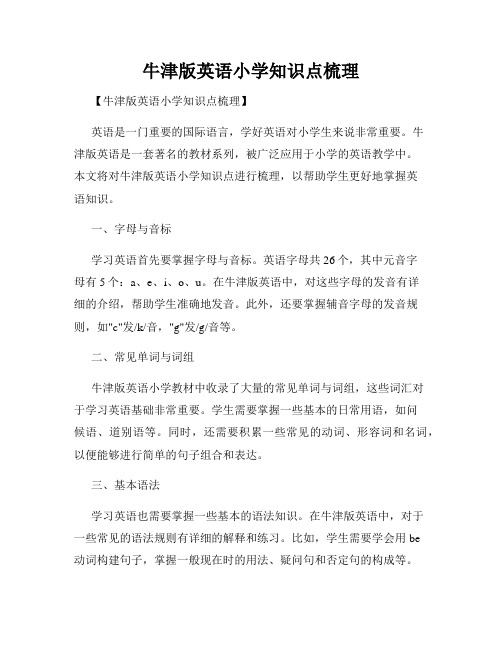
牛津版英语小学知识点梳理【牛津版英语小学知识点梳理】英语是一门重要的国际语言,学好英语对小学生来说非常重要。
牛津版英语是一套著名的教材系列,被广泛应用于小学的英语教学中。
本文将对牛津版英语小学知识点进行梳理,以帮助学生更好地掌握英语知识。
一、字母与音标学习英语首先要掌握字母与音标。
英语字母共26个,其中元音字母有5个:a、e、i、o、u。
在牛津版英语中,对这些字母的发音有详细的介绍,帮助学生准确地发音。
此外,还要掌握辅音字母的发音规则,如"c"发/k/音,"g"发/g/音等。
二、常见单词与词组牛津版英语小学教材中收录了大量的常见单词与词组,这些词汇对于学习英语基础非常重要。
学生需要掌握一些基本的日常用语,如问候语、道别语等。
同时,还需要积累一些常见的动词、形容词和名词,以便能够进行简单的句子组合和表达。
三、基本语法学习英语也需要掌握一些基本的语法知识。
在牛津版英语中,对于一些常见的语法规则有详细的解释和练习。
比如,学生需要学会用be动词构建句子,掌握一般现在时的用法、疑问句和否定句的构成等。
四、日常对话与情境交际牛津版英语小学教材中设置了许多日常对话和情境交际的练习,帮助学生提高口语表达能力。
这些对话和情境交际涉及到日常生活中的各个方面,如购物、问路、问时间等,学生需要通过练习,将这些对话进行模仿和实际运用。
五、阅读与写作阅读与写作是英语学习的重要环节。
牛津版英语小学教材中包含了一些简单的阅读文章,帮助学生培养阅读理解能力。
同时,教材中也有一些写作练习,让学生进行简单的句子和段落的书写,提高写作水平。
六、语法习题与听力训练为了加强对所学知识的巩固和掌握,牛津版英语小学教材中设置了大量的语法习题和听力训练。
学生可以通过这些练习来检验自己的学习效果,同时提高对英语语音的理解和听力能力。
小结:通过对牛津版英语小学知识点的梳理,我们可以更好地了解这套教材中的英语学习内容。
上海小学牛津英语5AM2知识点整理(含写作例文)
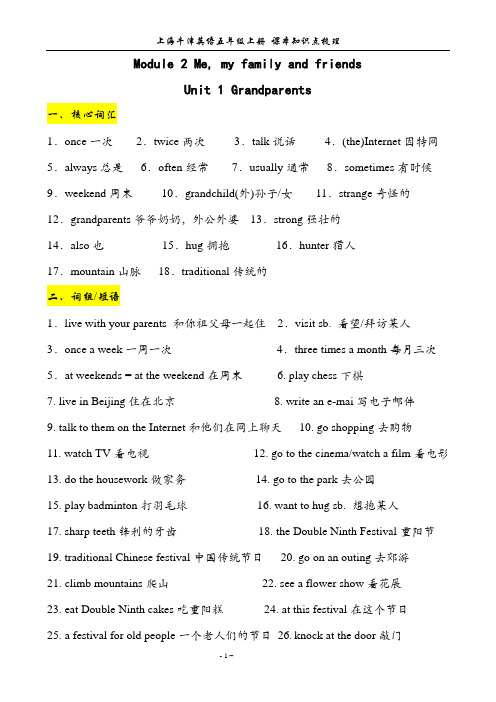
Module 2 Me, my family and friendsUnit 1 Grandparents一、核心词汇1.once一次2.twice两次3.talk说话4.(the)Internet因特网5.always总是6.often经常7.usually通常8.sometimes有时候9.weekend周末10.grandchild(外)孙子/女11.strange奇怪的12.grandparents爷爷奶奶,外公外婆13.strong强壮的14.also也15.hug拥抱16.hunter猎人17.mountain山脉18.traditional传统的二、词组/短语1.live with your parents 和你祖父母一起住2.visit sb. 看望/拜访某人3.once a week一周一次4.three times a month每月三次5.at weekends = at the weekend在周末 6. play chess下棋7. live in Beijing住在北京8. write an e-mai写电子邮件9. talk to them on the Internet和他们在网上聊天10. go shopping去购物11. watch TV看电视12. go to the cinema/watch a film看电影13. do the housework做家务14. go to the park去公园15. play badminton打羽毛球16. want to hug sb. 想抱某人17. sharp teeth锋利的牙齿18. the Double Ninth Festival重阳节19. traditional Chinese festival中国传统节日20. go on an outing去郊游21. climb mountains爬山22. see a flower show看花展23. eat Double Ninth cakes吃重阳糕24. at this festival在这个节日25. a festival for old people一个老人们的节日26.knock at the door敲门27. wear a red hat戴一顶红色的帽子28.run away逃跑29.how often多久30.have a cold得了感冒三、词汇解释1. play chess的意思是下象棋。
上海牛津英语级上册知识点梳理超全AMM

致易教育个性化辅导教案五年级上册课本知识点梳理Module1 Unit1一,核心词汇第一第二第三第四第五第六派对,聚会开始带来穿着最喜欢的二,词组1. at Peter’s birthday party在Peter的生日聚会上2. on the 19th of September在9月19日3.on Sunday在周日 4.at two o’clock在两点5. in the afternoon在下午6. at night在晚上7. sb. be tired某人很累 8. my favourite color我最喜欢的颜色9. That sounds interesting.那听上去有趣10. I can’t wait我等不及了 11. Happy Birthday 生日快乐12. Welcome to my party. 欢迎来我的派对13. a pair of orange trousers一条橙色的裤子14. make a birthday invitation制作一张生日请帖15. make a hat制作一顶帽子 16. have some fun过得高兴17. birthday present生日礼物三,词汇解释,take,carry辨析bring是指把人或物从别处带到说话人所在的地方;例如:Bring me some water, please.请给我取点水来;carry及物动词,“搬运,运送”,一般是指搬运较重的物品;例如:carry a box on one’s shoulder扛着箱子carry a baby on one’s back背着孩子“携带,带”例如:Almost every teacher carries a watch.差不多每位教师都带着一只表;I never carry much money about me.我身边不带许多钱;How many kilograms of luggage can I carry with me 我随身可以带多少公斤行李take是指把人或物从说话人的地方带到别处去;例如:Take my box to my room.把我的箱子拿到房间去;2. wear 穿着表示一种状态;put on 穿上是瞬间动作;四.本课重点本课重点学习疑问句when’s …和日期表达法;When 用来询问某件事什么时候发生,通常问的是某一天;它的回答是It’s on … ;注意,what time也可用来询问时间,但它通常询问某一时刻;五.课文学习is your birthdayIt is on the 19th of September.when用作疑问副词,引导特殊疑问句,指“什么时候”;用来对时间进行提问;例如:⑴When will you come to see me 你什么时候要来看我When are they going to visit the Great Wall他们打算什么时候去游览长城⑵序数词在句中可作主语、宾语、定语和表语;The second is what I really need.第二个是我真正需要的;作主语He choose the second.他挑选了第二个;作宾语We are to carry out the first plan.我们将执行第一个计划;作定语She is the second in our class.在我们班她是第二名;作表语注意:序数词在使用时,通常前面要加定冠词 the;但是如果序数词前出现不定冠词a 或an时,则表示“再......”,“又......”;We'll go over it a second time.我们再念第二遍;⑶日期的写法可以采用基数词和序数词两种形式;例如:March 1也可以写成March 1st;May 29也可以写成May 29th;但是,日期的读法只能用序数词的形式;例如: October 31October 31st读作Octoberthethirty-first2. what do you havewhat意为“哪个,哪些,什么”,询问内容;What is your birthday present你的生日礼物是什么啊Module1 Unit21.核心词汇出租车地铁 crossing斑马线 lights红绿灯人行道住离开 foot走路到达横过通过二,词组1. ride his bike to school骑自行车去学校2. walk to school / go to school on foot走路去学校home离开家 a quarter to eight在七点三刻5. live near school住的离学校近6. arrive at school到达学校7. cross the road穿过马路 8. at traffic lights在红路灯处9. wait for the green light等绿灯 10. on the pavement在人行道上11. look left向左看/向右看12. at zebra crossings在斑马线的地方13. underground station地铁站 14. take the train坐地铁15. get off the train下地铁16. at…Station在…站17. take Bus 乘12路公交车18. get off at Rainbow Road Bus Stop 在彩虹路站下车19. from the bus stop to Rainbow Primary School从车站到彩虹小学三,词汇解释1.live⑴ lively 有“活泼的、快活的、生动的”等意思,可以指人或物,可作定语或标语;但它没有“活着的”意思,而其他三个都有;如:Young children are usually lively.小孩子们通常是活泼的;He told a very lively story.他讲了一个生动的故事;⑵alive、live、living都有“活的、有生命的”意思,如:This is a live =living fish. =This is a fish alive.这是一条活鱼;Who's the greatest man alive =living man谁是当今最伟大的人物指人,不能用liveThe fish is still alive =living那条鱼还活着;指动物作表语时不能用live;3只有living前加the方可表示“活着的人”,作主语时,视作复数;如:The living are more important to us than the dead.活着的人对我们来说比死去的人更重要;2. arrivearrive 表示“到达某地”时,后面要接介词,到达的地方范围大是多用in,地方较小时用at,如:We arrived in Paris.我们到达巴黎;We arrived at the station.我们到达车站;reach 后面直接跟表示地点的词;He reached London. 他到达了伦敦;get to 到达What time shall we get to Shanghai 我们什么时候到达上海四.本课重点本课的重点是how的用法,意为“怎样,怎么”,用来询问方式,方法;介词by,on 的用法五.课文学习1. How do you come to school, Alice★ how用来提问方式、方法;一般用on foot,by bus等来回答;★ come 的意思是“来;到来”,不及物动词;2. When do you arrive at schoolAt about eight o’clock.表达在几点的介词用at2.Look left and look right before you cross the road;cross这里是动词,意为“穿过”;Module1 Unit3一,核心词汇工人飞行员农民assistant店员飞帮助生病的二,词组1. 想做某事 want to do sth.2. 飞行员/医生/厨师/农民/营业员pilot / doctor / cook / farmer / shop assistantan aeroplane in the sky在空中开飞机4.help sick people帮助病人 5. cook nice food烧美味的食物6. grow vegetables种蔬菜7. give lessons to students给学生上课8. sell things 卖东西9. doing a survey做一个调查10. in the street在街上11. Can I ask you some questions 我能问你一些问题吗12. in the future在未来,将来 13. dream job梦想的职业14. work at home在家工作 15. travel around the world环游世界16. be afraid of doing sth. 害怕做某事17. be good at singing擅长唱歌 18. hear a cry听到一阵哭声29. Jump into the lake跳进湖中 20. You’re brave.你很勇敢21. froggy / chick青蛙/小鸡三.词汇解释help的用法:1. vt. 帮助,通常用help sb. with sth.或help sb. to do sth.形式;如:Can I help 要我帮忙吗Can I help you 我能为你效劳吗向顾客主动提供帮助时的用语,与上一句在语境、功能上不一样;Would you like me to help you 要我帮忙吗We are going to help Mrs. Li to clean the house.我们要去帮李太太打扫房间;They helped me with my lessons yesterday. 昨天他们帮我做功课;2. n. 帮助Thank you for your help. 谢谢你的帮助;I'm going to ask for his help. 我将请求他给予帮助;You were a great help to me. 你对我有很大的帮助;It wasn't of much help to me. 这对我没有多大帮助;还有固定用法:Can’t/ couldn’t help doing sth. 表示情不自禁做某事四.本课重点本课重点是what引导的特殊疑问句,询问职业;一般现在时;动词want的用法;五.课文学习do you want to bewant当“动词”,意思是“想要、需要、要、想、希望”;A. want + n.例: I want a hot dog, please.B. want + to do,例: He wants to help you.C. want + sb. + to do例: She wants you to come in.2. I want to fly an aeroplane in the sky.fly 既可以做及物动词也可以做不及物动词;如:I want to fly.3.You are good at swimming.be good at doing sth. 擅长做某事;4.一般现在时用来表示“经常、反复发生的动作或行为及现在的某种状况”;⑴一般现在时的结构:主语+ am/is/are;主语+do/does⑵一般现时的标志词:always, usually, often, sometimes,every week day, year, month…, once a week, on Sundays等;如:It always snows here.Module2 Unit1一.核心词汇1. write an e-mail写电子邮件2. go shopping去购物3. play chess下棋一次两次谈话因特网二.词组1.和你祖父母一起住live with your parents2.visit sb. 看望/拜访某人 a week一周一次4. three times a month每月三次5. at weekends=at the weekend在周末6. play chess with grandpa和爷爷一起下棋7. live in Beijing住在北京8. write an e-mail to them写电子邮件给他们9. talk to them on the Internet和他们在网上聊天10. go shopping去购物 11. watch TV看电视12. go to the cinema/watch a film看电影13. do the housework做家务 14. go to the park去公园15. play badminton打羽毛球 16. want to hug sb. 想抱某人17. sharp teeth锋利的牙齿 18. the Double Ninth Festival重阳节19. traditional Chinese festival中国传统节日20. go on an outing去郊游 21. climb mountains爬山22. see a flower show看花展 23. eat Double Ninth cakes吃重阳糕24. at this festival在这个节日25. a festival for old people一个老人们的节日26. wear a red hat戴一顶红色的帽子三.词汇解释1. go shopping 是“去购物”的意思;go加上一个动词的-ing形式,可以表示去做某事;一些户外的娱乐活动常用这个结构;2. play chess的意思是下象棋;play的用法我们以前总结过,接球类单词时不加the,接了乐器类单词时加3. once 是一次的意思,twice 是“两次”的意思,注意:“三次”,“四次”,“五次”等,则用three times,four times,fivetimes来表示;4.由week周和 end末尾构成的复合词weekend是“周末”的意思;“在周末”可以说at weekends, “在平日”可以说on weekdays;5. 由 grand 和 parents 组成grandparents{外祖父母};6. 总是always,常常often有时sometimes,通常表示事情发生的频率;我们在四年级第二学期专门学习过这些频度副词,还包括,从不never,有这些词出现,一般用现在进行时;7. knock是动词,意思是“敲”,“敲门”应说成 knock at the door ;8. 由 house房屋和 work工作组成 housework 家务劳动是复合词;9. hunter 的意思是“ 猎人”,它是由动词 hunt打猎加-er构成;10. mountain是“山,山脉”的意思 ,它的近义词是 hill小山;11. outing 是名词,意思是“远足”或“短途旅游” ;go on an outing 是动词词组,意思是“去郊游”四.本课重点本课的重点是用How often … 多长时间……一次询问做某事的频率程度;五.课文解释1. Miss Fang is asking the children about their grandparents.★ ask…about…的意思是“询问…关于…” ;★ tell…about…的意思是“告诉…关于…”;talk about…的意思是“谈论关于…”;2. Do you live with your grandparents★ live with 的意思是“和…一起住”;3. I visit my grandparents at weekends too.★ too 在这里的意思是“也”,它的近义词为also;注意它们在句子中的位置不同,too,通常放在句尾,also通常用在谓语动词之前,或be 动词之后;4. On one’s way to …意思是“在某人去…的路上”;5. You sound very strange.★ 句中sound是系动词,意思是“听起来”6.I have a cold, my dear.★ cold是名词,意思是“感冒”,7. What strong arms you have★ 本句是用what引导的感叹句;What通常和名词词组搭配,而在how引导的感叹句中how通常和形容词搭配;本句可改为How strong your arms are8. Are you all right★ all right在本句中意思是“没什么问题,还好”注意- Can I go swimming with my brother-All right.好的,表同意;Module2 Unit2一.核心词汇相同的不同的双方都,两者都所有的班级 other 彼此,互相一起地,同时地二.词组1. We both like sports. 我们俩都喜欢运动2.like playing volleyball喜欢打排球3.help old people cross the street帮助老人过马路4.like each other相互喜欢5.at the same school在同一所学校6.in the same class在同一个班级7.in different teams在不同的队伍8.Let’s wait and see 让我们等着瞧9.a difficult match一场势均力敌难打的比赛10.Don’t worry. 不要担心11. Congratulations 恭喜12. I like riding bicycles. 我喜欢骑自行车13. play with all of you和你们所有人一起玩14. a friend called Tom一个叫Tom的朋友三.词汇解释1. same指“相同的”,反义词为different;same前面通常要有一个定冠词the,但是如果same前面已经有this,those等词,就不能再与the连用了;如:We are in the same class. 我们在同一个班级;结构:the same as 与......一样如:His mark is the same as mine. 他的分数和我的分数一样;译为“不同的”,其后的可数名词应为复数形式;如:We are in different classes. 我们在不同的班级;结构:be different from 与......不同如:This sweater is different from that one. 这件毛衣与那一件不同;different的名词形式为difference, 复数形式为differences四.本课重点本课重点both 和and 的用法;both 的意思是“ 两者都”,all的意思是“ 所有的”;两个词在句子中的位置相同,都在be 动词后,实义动词 do等之前;五.课文学习1. We both like helping people.⑴★both是说两者都怎么样,是指两者的,both的用法有两种,它可以和名词、代词连用,也可以和动词连用,在句中作主语、宾语及同位语,也可作定语both当形容词的时候,有both of the boys=both boys =both the boys两个男孩都...接代词的时候是both of us=we both我们都...当both做副词的时候,放在be动词,助动词,情态动词之后,行为动词之前比如说We both like English.We can both sing另外,both 也构成短语both...and...两者都...比如Both Tom and Tina like English. Tom和Tina都喜欢英语这里的“like”必须用复数形式⑵like1 like sb./sth.意为“喜欢某人/某物”We like each other.我们互相喜欢;2 like doing sth.意为“喜欢做某事”;She likes reading.她喜欢阅读;3 like 作介词,意为“像……”,在句中一般作状语或表语;Uncle Wang makes a machine like a bike and a plane.王叔叔制作了一个既像自行车又像飞机的机器;2. I want to play with all of you.all:⑴一切的, 所有的All the children are not noisy.并不是所有的儿童都吵闹;All his toys cannot make him happy.即使他的全部玩具也不能使他快乐;⑵全部的, 总的, 整个的All my flowers have died.我的花全死了;Module2 Unit3一.核心词汇北方南方西方东方学习 lot of 许多二.词组1. be happy with sth. 对…满意 room客厅3. This room faces east/south/west/north. 这个房间朝东/南/西/北4. read books there在那儿看书5. in the garden在花园里6. all day一整天7. tell sb. about sth. 告诉某人某事/某物8. share one bedroom分享一个卧室/住在同一个卧室9. The sun shines through the window. 日光从窗子照进来10. be far away from the school离学校远11. take 20 minutes花20分钟 12. by bus乘公交车13. in Spring在春天14. They live in the south in winter. 他们冬天住在南方15. find enough food找到足够的食物16. miss their home想念他们的家17. fly back飞回来 18. get up early起得早19. work late工作得很晚三.词汇解释1 move的意思是“ 移动”和move home的意思是“搬家”;2 hero是名词,意思是“英雄”,复数为heroes,课文中Heroes表示一个球队的名字,因此首字母要大写;3 floor的意思为楼层 ;它还有“地板,地面”的意思;4 kind在课文中是名词,意思是“种类”; many kinds of 意思是“许多种的”,all kind s of意思是“各种各样的”,后面接可数名词复数;杰克有许多不同种类的邮票;Jack has many kinds of stamps.大森林里有各种各样的动物;There are all kinds of animals in the forest.归纳kind 还是形容词,有“善良的”的意思;我妈妈非常善良;My mother is very kind.5 mouse的复数是mice;四.本课重点1本课重点复习why引导的特殊疑问句和because引导的答句;-Why do you like it 你为什么喜欢它-Because it’s so big And it faces south. There’s a lot of sunshine.因为它很大,而且朝南;阳光充足;2there be 句型五.课文学习1. Why do you like itBecause it is quiet.why 意为“为什么”,用来询问原因;用because 来回答;2. How many bedrooms are thereThere are three bedrooms.how many表示“多少”,用来询问数量;there be句型表示某地有或存在某人或某物;There is a desk in the room.Module3 Unit1一.核心词汇1hotel宾馆银行医院面包房博物馆电影院沿着转弯二.词组1. turn left 向左转2. at the first crossing 在第一个十字路口3. next to 靠近4. take the underground 乘地铁5. get off at Sea Street Station 在大海街站下车Park Road 在公园路 7. look at 看our left 在我们的左边for 寻找三.词汇解释1 本课的核心词汇是一些地点名词,有些地点名词和go搭配时有固定含义,如go to the hospital 去医院, go to the cinema 去电影院;2 along是介词,意思是“沿着,顺着”;沿着格林路走到餐馆;Walk along Green Road to the restaurant.3 turn 是动词,意思是“转弯”;向左转 turn left 向右转turn right{拓展} turn on 的意思是“打开开关,水龙头等”,turn off 是它的反义词,意思是“关掉”;打开收音机turn on the radio 关掉电视turn off the TV4 crossing是名词,意思是“十字路口”;cross是动词,意思是“穿过”;① 快些过马路,但不要跑;Cross the street quickly, but don’t run.② 请在第一个十字路口右转;Please turn right at the first crossing.5 ocean的意思是“海洋”,sea的意思是“大海”,它们是近义词;6 look for是动词词组,意思是“寻找”,注意与find相区分,find的意思是“找到”,表示寻找的结果;凯特正在找她的手表,但是她没有找到;Kitty is look for her watch, but she can’t find it.{归纳} look at 看着, see看见和listen to听着,hear听到也分别表示动作过程和动作的结果;7 laugh意思是“大笑”,smile是它的近义词,意思是“微笑”;① 这个笑话非常有趣;所有的人都大笑起来;The joke is very funny. All the people laugh.② 那个女孩总是对人微笑;The girl always smiles to others.四.本课重点How do I get to …,pleaseWalk along …句型;情态动词can;五.课文学习1. How do I get to the zoo,pleasehow 用于询问动作执行的方式、手段等,译为“怎样”,这里用来问路;2. What do you want to seeI want to see the birds.want to do sth. 想做某事I want to see the crocodile.我想看鳄鱼;3. You can see an underground station.can表示能力如体力和脑力方面,意为“能;会”等;例如:Can you speak English 你会讲英语吗Can you play the piano 你会弹钢琴吗Module3 Unit2一.核心词汇纽扣拉链口袋需要 5. put on 穿上 on 试穿漂亮的可爱的美丽的二.词组1. try on 试穿 a new one 需要一个新的3. with a big smile 带着一个大大的微笑silent 保持沉默 out 大声呼喊nothing on 什么都没有穿the box 在箱子里 the truth 说实话三.词汇解释1 clothes的意思是“衣服;服装”,包括:衬衣shirt,裤子 trousers短裤breeches, 外套coat,毛衣sweater,裙子 skirt女士衬衫blouse, 连衣裙dress, 夹克衫jacket;2 put on穿上的反义词是take off脱去,它们除了和衣服搭配使用外,还可以和鞋、帽、眼睛等搭配;①外面在下雨;穿上雨衣,凯蒂; It’s raining outside. P ut onyour raincoat, Kitty.②今天天气热,我把毛衣脱了; It’s hot today. I take off mysweater.{注意} put on 表示“穿上”的动作,wear表示“穿着”的状态;她穿着一件连衣裙; She wears a dress.她戴上帽子出去了; She puts on her hat and goes out.3 beautiful的意思是“漂亮的”,它的近义词是pretty美丽的;4 money的意思是“钱”,是不可数名词,“很多钱”应该说much money5 clothes shop的意思是“服装店”;在shop前加上名词可以表示某一类型的商店,如:toy shop玩具店, pet shop宠物店,shoes shop鞋店,6silent是形容词,意思是“无声的”, quiet也是形容词,意思是“安静的”;①在图书馆我们必须安静; We must be quiet in the library.②孩子们出去了,房间里寂静无声; The children go out and the roomis silent.7 nothing的意思是“没有什么”,和它对应的是某样东西;①瓶子里什么都没有; There is nothing in the bottle.②我看到天空中有什么东西; I see nothing in the sky.四.本课重点本课复习由which引导的疑问句及其回答;which的意思是“哪一个”,用于询问某个范围中的物品;问答这个问题时常会用到代词one那个;为了避免重复,在英语中常用one代替上文提到的物品;你喜欢那条裙子 - Which dress do you like我喜欢蓝色的; - I like the blue one.你喜欢哪个书包- I like the green one.五.课文学习1. It is too small. She needs a new one.too表示“太”的时候,放在形容词前面;She is too fat. 他太胖了;need动词,意为“需要”;I need a bottle of water.我需要一瓶水;2. Which dress do you like, the blue one or the pink oneI like the blue one.which的意思是“哪一个”,用于询问某个范围中的物品;问答这个问题时常会用到代词one那个;为了避免重复,在英语中常用one代替上文提到的物品;★or的意思是“或者”,可以连接两个并列的词组;3. Why not try on both1why not后面加动词原形,表示建议通常与how about doing sth. what about doing sth.why don't you do sth. 进行同一句转换2 try on 试穿If you like it,you can try it on.4. They both look great on you.他们穿在你身上都很好看;Module3 Unit3一、核心词汇1. fever发烧2. toothache牙痛3. cough咳嗽感冒形容身体状况良好药物二、词汇解释1 cough咳嗽,fever发热,cold 感冒,toothache牙痛都是表示疾病的名词,表示“生病”常用动词have;表示疾病的名词前通常要加a;① 他咳嗽发烧;He has a cough and has a fever.② 我牙疼; I have a toothache.2 medicine的意思是药,是不可数名词,表示“吃药”用动词take;你必须吃药; You must take some medicine.3 well和better都是用来形容身体状况的形容词;① 我今天感觉身体不适;I don’t feel well today.② 我感觉身体好多了; I feel better toady.{拓展} well还可以作副词修饰动词,意思是“好”;① 他篮球打得好; He play basketball well .4 soft drinks是指不含酒精成份的饮料,如可乐、果汁;5 lunch的意思是“午饭”,它和breakfast 早饭, supper晚饭,dinner晚饭;正餐是同类词;{注意} dinner 是“正餐”的意思,通常指晚上家里人在一起吃饭的那顿饭,所以,dinner 也有“晚餐”的意思;6 king和emperor是近义词,king的意思是“国王”,emperor是“皇帝”的意思;7 由tooth“牙齿”+less“ 较少的”构成toothless,toothless的意思是“无牙的”;{注意} tooth牙齿是可数名词,复数形式是teeth;四、本课重点本课复习情态动词should的用法;should的意思是“应该”,它的用法和我们学过的must一样,后面直接用动词原形;它表示的语气比must要缓和些,must一般用于强烈的、不容置疑的指示语或命令,should用于提出建议;① 我应该做什么- What should I do你应该吃药; - You should take some medicine.② 你不应该吃太多糖果;You shouldn’t eat too many sweets.五.课文解释1.Kitty is not feel well today.凯特今天觉得不舒服;How do you feel 你觉得怎样两句中 feel的意思是“觉得”What’s wrong with you 你怎么了★这是个常用表达方式, 和What’s the matter with you同义;这两句既可以问别人的健康情况,也可以问某物出了什么毛病;2.What else should I do 我还应该做别的什么★else的意思是“别的;其他的”;你还有别的要说的吗 Do you have anything else to say3.You will be better soon.你很快会好起来的;★will 也是个情态动词,表示将来要发生的事情或祝愿、希望等;4.You should drink a lot of water and have a good rest.你应该多喝水、好好休息;5.All right. 好的;★在本课中这个词的意思是“好;性;可以”;我们在M2U1学过的另外的意思是“平安无事”的意思;①Are you all right, Little Red Riding Hood 你没事吧, 小红帽② - Can you help me with it 你能帮我做这件事吗- Oh, all right. 哦,可以;6.Let’s go to see the dentist .让我们去看牙医吧;7.You shouldn’t drink too many soft drinks too .你也不应该喝太多的软饮料;★either的意思是“也”,和too也一样,都用在句子末尾;它们的区别是too用于肯定句,either 用于否定句;①I like orange juice too.我也喜欢橙汁;③I don’t like coffee either.我也不喜欢咖啡;8.How many times a day do you brush your teeth 你一天刷几次牙★how many times 用于问“多少次”,类似于how often, 但比how often更具体;- How many times a day do you wash your hands你每天洗几次手- About six times.大概六次;9.All the other animals are afraid of him.所有其他动物都害怕他;★句中的be afraid of的意思是“害怕”;10.The animals hide themselves in a secret cave.动物们把自己藏在一个秘密山洞里;★hide的意思是“躲藏”;①老虎来了;快藏起来The tiger is coming. Hide★them的反身代词是themselves,意思是“他们自己”;12. 哎哟哎哟我牙疼Ouch Ouch My teeth hurt★ ouch是语气词,相当于汉语中的“哎哟”,是身体某个部位疼的时候喊出的声音;★ hurt是动词,意思是“疼”;Module4 Unit1一.核心词汇首先其次然后最后茶煮沸倾倒喝二.词组some tea 泡茶 the tea 喝茶tastes great.尝起来很棒; the mountains 在山上5. in the west of China 在中国的西部6. be part of …是…的一部分up to the sky 上升到天空 8. fall down 落下三.词汇解释1. first adv. 第一;首先;表示顺序,另外还有同类词next其次,then然后,finally最后;2. boil 意为煮沸,We must boil the water.我们必须先把水煮开;boiled water 意为开水四.本课重点我们常用first, ... next, ... then, ... finally, ...表示事情发生的顺序;动词时态:现在进行时1现在进行时的构成be am, is, are + doing2现在进行时的应用:句中有look,listen,now五.课文学习1. We put some tea in the teapot.★put…in意思是“把某物放在…里”;2. We pour the tea into the cups and drink the tea.★pour …into意思是“把某物倒进…里”;3. Would you like some这里用some,不用any,表示希望得到对方的肯定回答;5. It meets more water from many other lakes and rivers.他与来自其他江河湖海的水汇聚;meet这里是动词,意为汇聚,相聚;另外还有遇见;遇到;与…迎面相逢的意思;例句:I meet an old school friend today.今天我遇到了一位老校友Module 4 Unit 2一.核心词汇1. gently 温柔地2. strongly激烈地3. slowly慢地4. quickly快地5. blow吹6. happily高兴地温柔地二.词组1. in the wind 在风里2. go out 出去3. look out of the window 看向窗外made of wood 由木头做成 a circle 画个圈it out 剪下来 along them 沿着他们剪下8. pin …to…把…钉在…上三.词汇解释gently为副词,其形容词为gentle;类似的词语还有strongly slowly,quickly,happily,他们的形容词分别为strong,slow,quick,happy.四.本课的重点副词,用来修饰动词;一般现在时和现在进行时的复习;情态动词can的用法五.课文学习1. The flowers dance in the wind softly.花儿在风中温柔地跳舞;句中softly为副词,修饰动词dance2. It’s raining heavily.现在进行时;heavily这里表示“很大地”,形容词为heavy3. Mum,can we go out nowcan 为情态动词,这里表示“允许,请求”;Can you give me some apples你能给我一些苹果吗5. The window blows gently.一般现在时,第三人称单数加s或es.Module 4 Unit 3一.核心词汇1. smoke 抽烟开始营火火柴仔细的安全二.词组1. talk about…谈论关于… with…与…一起玩3. die down 熄灭 a campfire升篝火away 丢掉,扔掉 out 爬出来三.词汇解释talk about…谈论关于…例如:They are beginning to talk about you. 他们开始议论你了;talk with sb. 和某人谈话例如:Your father will talk with you. 你父亲会说你的;talk to 对某人讲例如:I must talk to him about his rough behavior.我得好好说说他的粗野行为;四.本课重点情态动词must 和can的用法;祈使句的用法:祈使句imperative sentence 表命令、警告、提醒、建议、请求、叮嘱、号召等,谓语动词用原形;主语you 通常省略,句末用叹号或句号;五.课文学习1. He is talking about fire safety.他正在讨论用火安全;be talking about 现在进行时,表示正在讨论2. People must be careful.人们必须要很小心;must 意为“必须”为情态动词,后跟动词原形;在肯定句中表示推测;mustn’t 意为“禁止”;careful,小心仔细的,副词为carefully.3. Children,can you tell me bout fire safety孩子们,你们能告诉我有关用火安全的问题吗tell … about…意为“告诉…关于…”can 为情态动词,意为“能,可以”,表示请求4. It does not taste good at all.她尝起来一点也不好吃; not …at all 一点也不I don’t like it at all.我一点也不喜欢它;5. Here they are to help you.他们在这里帮助你;正常语序为:They are here to help you.。
三年级下牛津英语知识点整理M1

三年级下牛津英语知识点整理M1三年级下册的牛津英语知识点如下:- 表示爱好和兴趣的动词,如play, draw, dance, sing, swim, ride, climb等- 表示时间的词汇,如morning, afternoon, evening, night, day 等- 运动的动词,如run, jump, skip, hop, play football, play basketball等- 询问和回答问题的句型,如What do you like doing? I like playing football.- 表示喜欢或不喜欢的形容词,如like, love, don’t like, hate 等- 表示过去时间的词汇,如yesterday, today, tomorrow, next week等- 数字的表达和拼写,如one, two, three, four等- 表示能力和意愿的情态动词can和want to,如Can you ride a bike? Yes, I can./I want to ride a bike.- 能力和动作的形容词,如good at, bad at, fast, slow等Module 2: At school- 询问和回答问题的句型,如What’s your name? My name is Lucy.- 表示年级和学科的词汇,如grade, math, English, music等- 职业的词汇,如teacher, doctor, nurse, driver等- 表示教室里的动作和活动的动词,如read, write, listen, speak等- 表示位置的介词,如on, in, under, near, next to等- 表示所属关系的物主代词,如my, your, his, her等- 时间的表达,如hour, minute, o’clock, half past等- 表示频率和顺序的副词,如every day, first, second, third, last等Module 3: Home sweet home- 表示家庭成员的名词,如father, mother, brother, sister, grandma, grandpa等- 表示房间和家具的词汇,如bedroom, living room, kitchen, sofa, fridge等- 询问和回答居住地的句型,如Where do you live? I live in Beijing.- 表示位置的介词,如in, on, under, next to等- 表示地点和距离的副词,如here, there, far, near等- 表示物品所有者的词汇,如my, your, his, her等- 形容词的比较级和最高级形式,如big, bigger, biggest等- 数字的序数词形式,如first, second, third等Module 4: My clothes- 表示衣服的名词,如T-shirt, shirt, skirt, shorts, shoes, socks等- 形容词的颜色和大小形式,如red, blue, yellow, big, small等- 询问和回答衣服颜色的句型,如What color is your T-shirt? My T-shirt is red.- 询问和回答穿着衣服的句型,如What are you wearing? I am wearing a green shirt and blue shorts.- 询问和回答物品价格的句型,如How much is this T-shirt?It’s 20 yuan.- 数字的表达和拼写,如one, two, three, four等- 表示物主关系的物主代词,如my, your, his, her等- 表示物品所有关系的of词组,如a pair of socks, a cup of tea等Module 5: Food and drinks- 表示食物和饮料的名词,如apple, banana, sandwich, cake, juice, milk等- 询问和回答所需食物和饮料的句型,如What do you want? I want an apple and a cup of juice.- 表示食物和饮料的量的词汇,如a, an, some, a bottle of, a glass of等- 表示口味的词汇,如sweet, sour, salty等- 询问和回答食物和饮料的味道的句型,如How does it taste? It tastes sour.- 表示健康和坏习惯的形容词,如healthy, unhealthy, good for 等- 询问和回答喜欢或不喜欢食物和饮料的句型,如Do you like bananas? Yes, I do./No, I don’t.-表示动作和习惯的动词。
上海牛津英语4A 单元知识整理M1M2
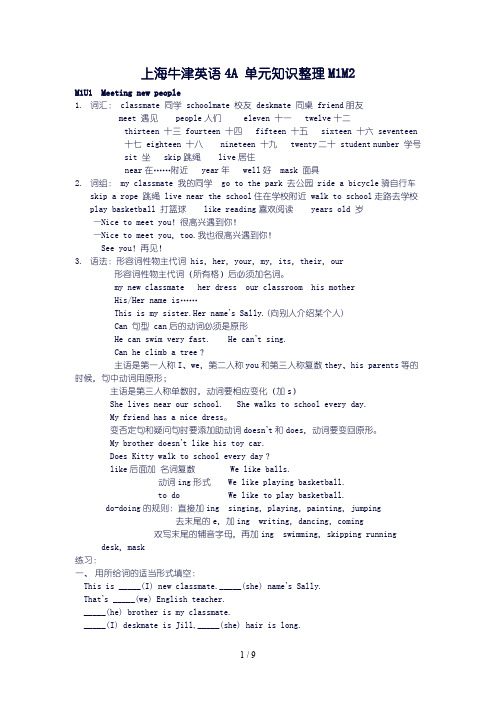
上海牛津英语4A 单元知识整理M1M2M1U1 Meeting new people1.词汇: classmate 同学 schoolmate 校友 deskmate 同桌 friend朋友meet 遇见 people人们 eleven 十一 twelve十二thirteen 十三 fourteen 十四 fifteen 十五 sixteen 十六 seventeen十七 eighteen 十八 nineteen 十九 twenty二十 student number 学号sit 坐 skip跳绳 live居住near在……附近 year年 well好 mask 面具2.词组: my classmate 我的同学 go to the park 去公园 ride a bicycle骑自行车skip a rope 跳绳 live near the school住在学校附近 walk to school走路去学校play basketball 打篮球 like reading喜欢阅读 years old 岁—Nice to meet you!很高兴遇到你!—Nice to meet you,too.我也很高兴遇到你!See you!再见!3.语法:形容词性物主代词 his,her,your,my,its,their,our形容词性物主代词(所有格)后必须加名词。
my new classmate her dress our classroom his motherHis/Her name is……This is my sister.Her name’s Sally.(向别人介绍某个人)Can 句型 can后的动词必须是原形He can swim very fast. He can’t sing.Can he climb a tree?主语是第一人称I、we,第二人称you和第三人称复数they、his parents等的时候,句中动词用原形;主语是第三人称单数时,动词要相应变化(加s)She lives near our school. She walks to school every day.My friend has a nice dress。
牛津版三年级英语知识点梳理

Module 1
核心词汇:Mr, Mrs, Miss
词汇
词汇拓展:Just so-so. I'm sick. Not too bad.
I am _______.
Unit 1
语法
This is _______.
We have ________.
How are you?
口语交际
Unit 10
词汇 语法 口语交际
语音知识
Module 4 核心词汇:insect bee ladybird butterfly ant 词汇拓展:dragonfly fly What are they? They are ______. What's it ? It's a/an ____. What's it ? It's a/an ____. Look at the _____ It's _____ 字母 U 在闭音节中的发音。
批注 [S3]: 身体器官,POPKIDS3B unit 6 中有所涉及
Unit 7
词汇 语法 口语交际 语音知识
核心词汇:school hall library toilet playground classroom 词汇拓展:photo rose shine where Where is the classroom? What is this? It's a ______. Is this _______? Yes, it is./No, it isn't. What is this? It's a classroom. Is this a library? Yes,it is./No,it is a toilet. 字母 O 在开音节中的发音。
上海牛津英语AM知识点总结
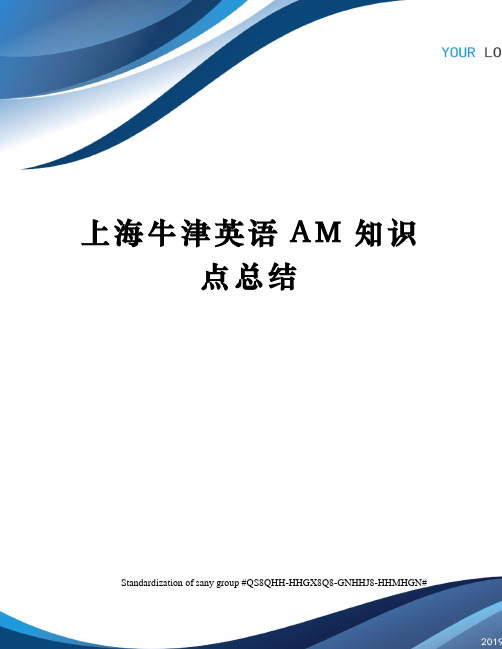
上海牛津英语A M知识点总结Standardization of sany group #QS8QHH-HHGX8Q8-GNHHJ8-HHMHGN#M4U1 A visit to a farm1.单词visit参观;拜访,hay干草,grass草,corn谷物,meat肉,litter乱扔(垃圾),walk走,pick摘;捡,throw扔,stone石头,don’t不要,rubbish垃圾(不可数), bin垃圾箱2.句型1).On his farm he has three sheep.在他的农场上有三只绵羊。
2). Don’t litter. 不要乱扔垃圾。
3). Don’t walk on the grass. 不要在草地上走。
4).Don’t pick flowers.不要摘花。
5). Don’t throw stones.不要扔石头。
6). Please put the rubbish in the rubbish bin.请把垃圾放在垃圾箱里。
7). Now let’s visit the farm.现在让我们参观农场。
8). What do they eat 它们吃什么9). They eat hay.它们吃干草。
10). He feeds the pig with the corn.他用谷物喂养猪。
11). The pig lives in a pen.猪住在围栏里。
12). It is angry.它生气了。
3.语法:4.1).单复数:sheep---sheep(单复同形);5. horse----horses;6. child---children7. this---these;8. that---those9.2).hay, grass, corn, meat, rubbish(垃圾),都是不可数名词。
10.3). feed the animals喂养动物; grow the plants种植植物11.4). Don’t litter. (换一种说法) >>> You can’t litter.12.Don’t walk on the grass. (换一种说法) >>> You can’t walk on thegrass.13.5). let’s = let us让我们,后面跟动词原形:14.Let’s go. Let’s play. Let’s sing and dance.15.6). take a visit to + 地点,一次去…的参观16.Let’s visit the farm. = Let’s take a visit to the farm.17.M4U2 At Century Park1.单词sketchbook素描本,cap帽子, camera-cameras相机, an aviary -aviaries 鸟舍,fountain喷泉, photo-photos照片, pond池塘, lovely =cute可爱的,far way远的road道路,take乘坐、拍照2. 词组:at Century Park在世纪公园 in the picnic basket在野餐篮里,let me see我看一下, some peanut butter一些花生酱, have a picnic 去野餐,take the school bus= go there by bus 乘坐校车, be ready for为...做好准备far away from 很远-near 附近, look at the map of the park看公园的地图 ,beautiful flowers and plants美丽的花和植物, the plant house植物园, some aviaries一些鸟舍, next to紧靠…==beside 在...旁边= near在...附近home for birds小鸟的家 , go and have a look去看一看 ,of course =sure当然, take some photos拍照片 show them(展示)给他们看,beside the fountain喷泉旁边, play on the swing荡秋千 ,watch the fish and ducks观赏鱼和鸭子, under the tree在树下面,play in the garden在公园玩 swing very high (秋千)荡的非常高,slide very fast滑的非常快3. 句型is Century Park 世纪公园在哪里It’s far away from our school.它离我们学校很远。
- 1、下载文档前请自行甄别文档内容的完整性,平台不提供额外的编辑、内容补充、找答案等附加服务。
- 2、"仅部分预览"的文档,不可在线预览部分如存在完整性等问题,可反馈申请退款(可完整预览的文档不适用该条件!)。
- 3、如文档侵犯您的权益,请联系客服反馈,我们会尽快为您处理(人工客服工作时间:9:00-18:30)。
小学英语牛津版A M M知识点汇总集团文件版本号:(M928-T898-M248-WU2669-I2896-DQ586-M1988)M3U1 Around the city(一)Words 单词1. around 绕着2. city 城市3. hotel 旅店,旅馆4. bank 银行5. hospital 医院6. bakery 面包房7. museum 博物馆8. cinema 电影院9. along 沿着 10. left 左边(反义词:right 右边)(二)Phrases 词组1. Excuse me. 劳驾,请问2. get to City Cinema 到达城市影院3. get to the zoo 到达动物园4. take an/theunderground 乘地铁5. at Brown Street Station 在布朗街车站6. get off at Sea Street Station 在海洋街车站下车7. on Park Road 在派克路8. walk/go along Green Road 沿着格林路走9. turn left 向左转 10. at the first crossing 在第一个十字路口11. next to the underground station 紧靠地铁站(三)Sentences 句子1. Excuse me. How do I get to City Cinema请问,我怎么到达城市电影院?2. Take the underground at Brown Street Station and getoff at Sea Street Station.在布朗街车站乘地铁,在海洋街车站下车。
3. Walk/Go along Green Road and turn left, and then cross Park Street.沿着格林路向左转,然后穿过派克街。
M3U1 At the zoo(一)Words 单词1. meet 见面(同音词meat)2. crocodile 鳄鱼3. lane 小路,巷,弄4. great 好极了5. zebra 斑马6. snake 蛇7. monkey 猴子8. lion 狮子 9. ocean 海洋 10. world 世界 11. sea 大海(同音词see)12. turn 转动 13. shark 鲨鱼 14. afraid 害怕(反义词brave)15. dolphin 海豚 16. pool 池塘 17. cute 娇小伶俐的(近义词clever)18. restaurant 饭店 19. ask 问(反义词answer) 20. dark 黑暗的(反义词bright)21. giraffe 长颈鹿 22. naughty 调皮的 23. laugh 大笑(微笑smile)(二)Phrases 词组1. different animals 不同的动物2. look at a map ofthe zoo 看一张动物园的地图3. on our right 在我们右边(on our/the left)4. after that 从那以后5. walk along Winter Lane 沿着Winter 路走6. a visit to Ocean Word 参观海洋世界7. sea animals 海洋动物 8. at Ocean World在海洋世界9. in a big pool 在大池塘里 10. twelve fifteen 十二点一刻(a quarter past 12)11. look for a restaurant 寻找饭店 12. get to the restaurant 到达饭店13. make us laugh 让我们大笑(三)Sentences 句子1. Peter meets his friends at the zoo.Peter在动物园见他的朋友。
2. They are looking at a map of the zoo.他们在看一张动物园的地图。
3. The Wangs are going to Ocean World.姓王的一家人正准备去海洋世界。
4. The dolphins are jumping and swimming in a big pool.海豚正在大水池里跳跃,游泳。
5. Go along Green Road and turn right at the first crossing.沿着格林路走,在第一个路口向左转。
M3U2 Buying new Clothes(一)Words 单词1. clothes 衣服2. button 纽扣3. zip 拉链4. pocket 口袋5. which 哪一个6. dress 连衣裙(复数dresses)7.shirt 男衬衫8. blouse 女衬衫 9. T-shirt T恤衫 10. skirt 短裙11. shorts 短裤12. pants 裤子(同义词trousers) 13. price 价格14. try 试一试15. buy 买(反义词sell) 16. idea 主意17. pretty 漂亮的(二)Phrases 词组1. put on her dress 穿上她的连衣裙2. at aclothes shop 在衣服店3 a pair of shoes 一双鞋 4. two pairsof trousers 两条裤子5. the pink ones 粉色的那些6. try on 试穿7. a good idea 一个好主意 8. too small 太小了9. which T-shirt 哪一件T恤衫(三)Sentences 句子1. Which coat do you like I like the green one.你喜欢哪一件外套?我喜欢绿色的那件。
2. How much is it It’s 85 yuan.它多少钱? 85元。
3. How much are the pants They are 70 yuan.裤子多少钱? 70元。
4. My dress is too small. Yes. You need a new dress, I think.我的连衣裙太小了。
是的。
我想你需要一件新的。
5. Why not try on both Good idea.为什么不两件都试一下呢?好主意。
M3U2 Buying new Clothes(一) Words 单词1. pretty 漂亮的(反义词ugly 丑陋的)2. emperor 皇帝3. magic 魔术4. nod 点头5. smile 微笑6. money 钱7. keep 保持8. silent 安静的 9. cry 哭(三单cries)10. nothing 没有东西 11. dot 圆点12. truth 实话(形容词true真实的) 13. sweater 毛衣 14. raincoat 雨衣15. slippers 拖鞋 16. sneakers 旅游鞋;胶底鞋 17. boots 靴子(二) Phrases 词组1. try on these dresses 试试这些连衣裙2. look great on you 太适合你了3. take the blue one 买蓝色的一条4. with some new clothes 带着一些新衣服5. with a big smile 笑容可掬6. a lot of money 许多钱7. put on new clothes 穿上新衣服(wear new clothes 穿着新衣服)8. keep silent 保持安静 9. cry out 大喊(大声疾呼)10. polka dot 带圆点花纹11. hundreds of polka dots 数百个圆点,成百上千个圆点(三) Sentences 句子1. What do you think, Mum They look great on you.妈妈,你觉得怎么样?它们看上去很适合你。
2. Then let’s take the blue one.那我们就买蓝色的那条。
3. One day, a man visits the emperor with some new clothes.一天,一个男人带着新衣服拜访了这个皇帝。
4. The emperor cannot see any clothes, but he nods with abig smile and says, “ They are so beautiful!”皇帝看不见衣服,但他笑容可掬地说:“衣服多么漂亮!”M3U3 Seeing the Doctor(一) Words 单词1. fever 发热2. toothache 牙痛3. cough 咳嗽4. rest 休息5. warm 温暖的(反义词cool 凉爽的)6. dentist 牙医7. medicine 药8. soft 软的(反义词hard 硬的) 9. before 在…之前(反义词after在…之后)10. should 应该(shouldn’t= should not 不应该) 11. soon 不久之后 12. will 将13. good 好的(近义词:well 身体好的比较级: better最高级: best)(二) Phrases 词组1. see the doctor 看医生2. have a cold 得了感冒3. wear warm clothes 穿暖和的衣服4. have a good rest 好好休息一下5. drink a lot of water 喝很多水6. drink too much soft drinks 喝太多软饮料7. take some medicine 吃一些药 8. feel well 感觉良好9. have a look 看一看(三) Sentences 句子1. I have a toothache. What should I doYou should go to see the dentist. You shouldn’t eat too many sweets.我牙痛,我应该干什么?你应该去看牙医。
你不应该吃太多的糖。
2. I have a cold. What else should I doYou should go to see the doctor. You should drink a lotof water and have a good rest.我得了感冒,我应该干什么?你应该去看医生。
